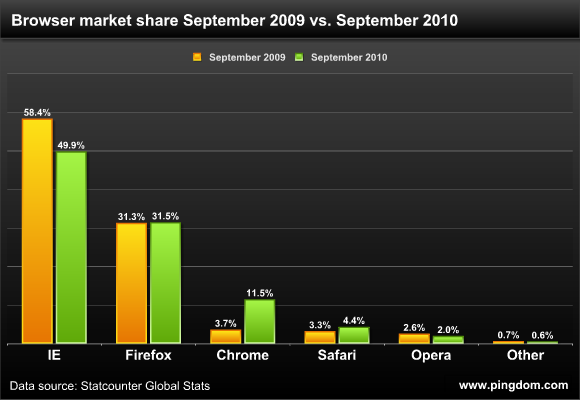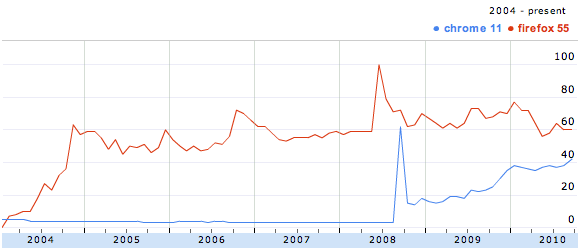 Google’s Chrome web browser has only been around for two years, but with an almost frantic pace of development it’s already gone through more iterations in that brief time than many other software products do in a decade. Chrome is now up to version 6, and has a rapidly increasing share of the web browser market. It’s now in third place after Firefox and Internet Explorer.
Google’s Chrome web browser has only been around for two years, but with an almost frantic pace of development it’s already gone through more iterations in that brief time than many other software products do in a decade. Chrome is now up to version 6, and has a rapidly increasing share of the web browser market. It’s now in third place after Firefox and Internet Explorer.
Before Chrome arrived, Mozilla’s Firefox was the darling of the techie crowd (and in many regards it still is, but Chrome is a great, looming shadow on the horizon). Now, Firefox growth has flatlined. It’s still by far the largest web browser after Internet Explorer, but it’s no longer gaining market share.

The above chart makes several things abundantly clear about the browser market:
- Internet Explorer is losing market share (as it has been ever since Firefox arrived in 2004).
- Firefox is neither growing nor losing market share.
- Chrome has more than tripled its market share in the last year. It’s growing much faster than any other browser.
And there are additional signs that Chrome is quickly becoming a big player.
Mindshare catching up even faster
Market share is one thing, but people are getting more and more interested in Chrome. It’s gaining mindshare even faster than it’s gaining market share, which bodes well for Chrome’s future.
Interest in Chrome vs. Firefox:

Source: Google Insights for Search.
When it comes to establishing mindshare, Google has a huge advantage over Mozilla. They own not just one, but several of the world’s largest web properties, and they have frequently been advertising Chrome on sites like YouTube and the Google Search homepage (Google.com). We’re not trying to belittle what Google has done with Chrome, it’s an excellent browser, but with Google pushing it on its own sites, Chrome has one heck of a home field advantage.
Looks like we’re heading right into a new browser war, with IE, Firefox and Chrome duking it out in the top. Next year is going to be interesting.



























